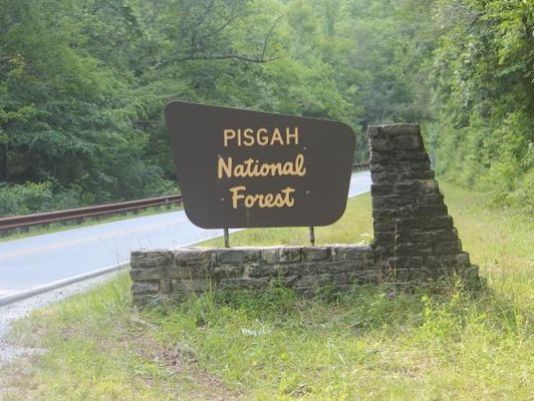ADA Blog – Western NC Self-Advocates Bring Changes to Community
Original article ran in the July 2017 issue of Highlights & Hot Topics 
The hills are alive with beauty for all to see in Western North Carolina – well, almost all. While many of the parks and campgrounds boast of being accessible to people of all abilities, the reality isn’t necessarily so.
Kathy Hollingsworth, a program specialist with DisAbility Partners, a Center for Independent Living in Asheville, NC, gathers together self-advocates from her place of business to head out into the community to do an annual Americans with Disabilities Act project. This three-person self-advocate group along with Hollingsworth, whose projects are supported by the NC ADA Network project of Community Enterprises, LLC in Greensboro, NC, go out on a variety of fact-finding missions on ADA compliancy.
Pisgah National ForestIn 2016, the self-advocates chose area campgrounds as their ADA project and found some challenges that many people may not notice. Pulling into the Davidson River Campground just inside the Pisgah National Forest near Brevard, NC, the group was handed a map of campground lots and restroom locations. However, the map does not indicate which lots and which restrooms are accessible. Campers with disabilities may drive around looking at camping sites and find one which will work for them, only to unpack and head to the restroom to find that particular location does not have accessible facilities.
“It’s an easy fix,” explains Hollingsworth, who asks the campground managers to simply note the accessible restrooms and camping sites with a special designation on the printed maps. In addition, signs on the camping sites and bathroom buildings indicating accessibility – ones that could be seen from the park roads – would also be helpful.
Mount Pisgah is part of the Appalachian Mountain range and the campgrounds are along the Blue Ridge Parkway. The scenery is breathtaking, but an issue arises with the accessible restroom. On a recent trip, Hollingsworth opened the bathroom stall door to find the side grab bars were located on the opposite side from the toilet. Maneuvering onto the toilet would be impossible for a person using a wheelchair.
Situated in a heavily wooded area on the banks of Lake Powhatan in the Appalachian Mountains of western North Carolina are the campgrounds. The lake is a popular spot for visitors and with its accessible bath house complete with accessible restrooms - a dream for visitors of all abilities. Hollingsworth’s crew was excited to visit and – were greeted with steep stairs leading down to the bathhouse. There was no way a person who has difficulty walking, balance challenges or uses a wheelchair would be able to get to the bathhouse or the lake.
One additional issue in these parks and campgrounds, Hollingsworth added, is the route between the picnic tables and accessible restrooms. Often, there is no accessible route, so the person with disability must get back in their car or van and drive themselves back and forth between the picnic grounds and the restrooms.
She notes one campground had an accessible restroom but no paved, accessible parking. The park eventually paved a couple of spots providing the accessible parking. It’s a step forward.
Again, says Hollingsworth, “A lot of it is just logic. Plus, you have to be willing to make these changes.” But, she adds, changes are slow to happen.
Hollingsworth’s self-advocates group began doing an annual ADA project several years ago. Other ADA projects they have worked on include:
- Emergency preparation checks on accessible safe sites in case of disasters such as tornadoes, floods, fires, etc.
- Offering a service animal workshop to area businesses to help them understand the duty of these animals and the need to allow them into their stores and offices.
In 2017, they performed a secret shopper test in stores that included high-end, mid-level and low-cost shops. The three shoppers had disabilities that included blindness, deafness and a mobility disability requiring use of a wheelchair. The goal was to see how customer services accommodated people with disabilities. They found that while all stores were good at accommodating their secret shoppers, the high-end stores were the most accommodating. Hollingsworth’s group followed up with the store managers on their findings, made suggestions and offered training for the stores’ employees.
As part of her position with DisAbility Partners’ Center for Independent Living, Hollingsworth performs accessibility surveys when businesses request them. She has done them for UNC-Asheville, for a co-housing community and for five different areas in Transylvania County Parks and Recreation.
Hollingsworth states that often times simple fixes and solutions can make a world of difference to someone with a disability.